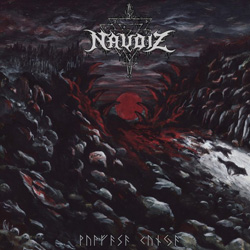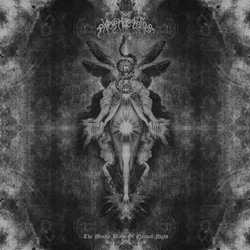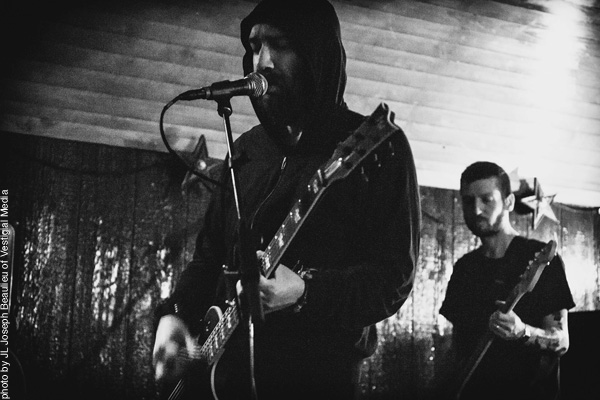A venue such as Kung Fu Necktie exists in every decent-sized city in America. There, a band such as Junius (pictured above), who has been plugging along for years now with its unique post-metal sound, can play with an industrial-metal support act and the same room will later host Bölzer, a black metal band who put German label Iron Bonehead Records on the map. This as well as the wide scope of bands playing events such as the Decibel Metal & Beer Fest (look for a review soon) show that the thing that makes underground metal so vibrant is its diversity.
Junius
Kung Fu Necktie, Philadelphia, April 19
Junius doesn’t make it easy on the listener, and never really has. It all started when the band formed in 2003, at a time when post-metal was a little-used term and not a section in your local record store. Despite being ahead of the curve, the band is not usually mentioned in the same breath as, say, Russian Circles or Intronaut, even though they came first, or Isis, even though they never went away. There’s a very simple reason for this: everyone else is playing checkers while Junius plays a game that is a lot more complex. In short, they’re artists and what they do is art.
Junius is a band that doesn’t believe in small talk. The band strapped in and set about performing with barely any eye contact with the audience. Not only is there little talk between songs, there is little anything between songs. Maybe that is because the band spent a lot of time the past several years in support slots, forced to perform truncated time-limited sets before still-arriving crowds. Whatever the case, the group played nearly a dozen tracks with a steely determination and a premium on precision.
Given the lengthy set time, it was a little surprising that the band didn’t perform anything older than “Stargazers & Gravediggers” off of 2009’s The Martyrdom of a Catastrophist. However, by highlighting its newest material from its latest release, Eternal Rituals for the Accretion of Light, Junius showed off its newfound accessibility. They performed seven of the ten songs from the album, each song catchier than the last. “A Mass for Metaphysicians” with its Deftones-like wail, the chugging chorus of “Clean the Beast” which could be a Mastodon outtake, and even lilting album closer “Black Sarcophagus” tempered prog indulgences with visceral songcraft that more than makes up for any strident aloofness.
Inaeona, who share both a record company and a hometown of Boston with Junius, was a nice industrial pop contrast to the metallic progressiveness of the headliner, with a set culled exclusively from 2015’s Force Rise the Sun LP. Frontwoman and guitarist Bridge Laviazar doesn’t hold anything back, with raw emotions contrasting with the mechanized music. You can dance to Inaeona or just take it all in and share in the catharsis, and either response is perfectly acceptable.
Iron Bonehead Productions
 When Swiss black metallers Bölzer burst onto the scene with 2013’s Aura EP, the band’s international acclaim allowed Iron Bonehead Productions to finally receive the recognition that was long overdue. The German label had been churning out underground bands for more than two decades and unlike other similar record companies, hasn’t limited the bands it releases to specific regions or genres. Typifying this diversity are two albums just released by bands that have completely different backstories and sounds. The only thing they have in common is both records are their sophomore releases.
When Swiss black metallers Bölzer burst onto the scene with 2013’s Aura EP, the band’s international acclaim allowed Iron Bonehead Productions to finally receive the recognition that was long overdue. The German label had been churning out underground bands for more than two decades and unlike other similar record companies, hasn’t limited the bands it releases to specific regions or genres. Typifying this diversity are two albums just released by bands that have completely different backstories and sounds. The only thing they have in common is both records are their sophomore releases.
As witnessed on Wulfasa Kunja, Naudiz is an Italian black metal trio whose primitive barbaric riffs and jackhammer percussion show a debt to the Norwegian second wave, as further emphasized by the Norse allusions in the song titles. However, its ferocious musical undercurrent and vocalist Uruz Dagaz’ penchant for punctuating the proceedings with feral grunts reminds me of when Hellhammer helped invent this stuff. Tom Warrior would certainly approve.
 Pyriphlegethon is different in almost every measurable way. For one thing it’s not even a band. The project, named after one of Hades’ rivers, is a solo excursion for Maurice de Jong (some people call him Mories), who has spent the past decade releasing increasingly disconcerting noise experiments as Gnaw Their Tongues, as well as dozens of lesser-known but no less potent releases under different names.
Pyriphlegethon is different in almost every measurable way. For one thing it’s not even a band. The project, named after one of Hades’ rivers, is a solo excursion for Maurice de Jong (some people call him Mories), who has spent the past decade releasing increasingly disconcerting noise experiments as Gnaw Their Tongues, as well as dozens of lesser-known but no less potent releases under different names.
The Murky Black of Eternal Night is even more primal and minimalistic than anything Gnaw has done, which is a feat in and of itself. It is overflowing with putrid vocals, mechanical drum machine, and strangled riffs combined in a claustrophobic mix that creates a condensed yet blistering wall of sound. Standing out as the penultimate song on the album, “The Coldest Grave” is a catchy pop song set to a clanking industrial bludgeoning and replete with a memorable chorus and lead guitar anti-solo that sound like something Helios Creed could have conjured up if he was into Satan instead of psychedelics.


Your Comments